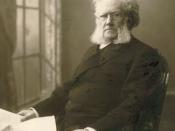topic question: Discuss some of the ways in which plays challenge boundaries of race/ethnicity, class, and/or gender. In your answer make detailed reference to one or move plays you have studied.
Ghosts, by Henrik Ibsen, is a realist drama written in 19th century Norway. The social context of this time meant his play was seen as a radial piece and theaters often refused to play it, afraid of backlash from the conservative Lutheran community. This is due to the boundaries of class and gender which are constantly challenged throughout this play, in both a historical and modern context. In respect to class, this is achieved primarily through the use of characterization and a fundamental theme of deceit, which highlights the juxtaposition between different classes. In terms of gender, the challenging of traditional roles is created due to the confronting nature of many events depicted in this novel, particularly those surrounding euthanasia and character of Mrs.
Alving. This is a prime example of how the challenged boundaries can be easily related to modern times as euthanasia is a controversial modern issue. This modern context once again helps to cement the ways in which boundaries are challenged constantly by Ibsen in his work. However, the issues of class mentioned in this drama relate directly towards the context of Ghosts.
Regina is a fundamental character used by Ibsen to challenge the gender boundaries of his authorial context. In 18th century Norway, women held a significantly lower position in the societal hierarchy. The influence of the conservative Lutheran Church meant that they were primarily the property of the husband, and motherhood was seen as the epitome of their existence. Martin Luther, the pioneer of the Lutheran Church, split from the Catholic Church, and has been quoted as saying "If a woman grows weary...



How readers Bridge the Gap to a past society in Remember Babylon
"The past is a foreign country; they do things differently there."
Write an essay on the ways that readers bridge the gap to a past society represented in the text studied.
In 1953 L.P Hartley produced a work entitled The Go Between, whose famous first line was "The past is a foreign country; they do things differently there." This phrase has become iconic as the novel grew in popularity. Why? Because in essence, this quote is entirely correct. The difference between past and present is highlighted eminently in David Malouf's Remembering Babylon. As a reader of this novel we are encouraged to bridge this gap, to bridge the difference in culture, beliefs and even the physical nature of the landscape given to us in this novel, set in the late 1800's. This connection is prompted through the perspective nature of the novel, the utilization of second person narrator, the use of literal landscape descriptions and the familiar concepts which are weaved into the fabric of the novel. Malouf has created a work of fiction which involves the reader and constantly encourages the bridge between past and present to be continually strengthened as the reader enters the fictional narrative.
This fictional world is Australia in the 1800's. The scene for this setting is introduced in the early pages of the novel. We see the use of documentary style writing to draw the reader, who in this context can be considered a 21st century female from the hegemonic discourse of Australia in the 21st century, into the physical confines of 19th century Australia. Descriptions of "clay-packed earth" (p1) and "intense heat that made everything you look at warp" portray the Australian bush in all it's rugged glory. It calls upon common conceptions of Australia, conceptions such as, to quote Dorothea Mackellar in her ever-famous My Country poem, "Of ragged mountain ranges/Of droughts and flooding rains." These ideals are easily accessed by a wide range of Australians and allow free and easy access to the physical world of Remembering Babylon.
However, despite the easy access which familiar descriptions may allow, it can be said that it does not give a true bridge to the past. Many Australians, particularly those from the hegemony, are not the archetypal Australian. According to the 2005 census only 2.6% of people lived in remote and very remote regions and the majority of those people were indigenous Australians. The fact remains is the modern Australia, whilst often idolizing the bush does not experience it on the level portrayed in Remembering Babylon. So, arguably, the familiar themes utilized in the physical descriptions of not that familiar after all, merely two dimensional stereotypes of Australia.
Additionally, the issue of writer context is also important to remember. David Malouf published Remembering Babylon in 1993. To apply a post-modern discourse to this we can understand that this means that neither Malouf nor the modern reader have the ability experience the true nature of Queensland in the 1800's. All these readers ever experience is a mediated view of this society, and even this is constructed through a range of means. The text itself is a secondary fictional source, which is then channeled through the various perspectives of the character constructs and then once again through the readers own discourse. This notion is apparent not only through the physical descriptions but the ethnic cultures depicted in this society.
We see pivotal events such as Gemmy's introduction to the community and when the indigenous Australians visit Gemmy through different lens. Each of these offers a new part to the story, not the a priori truth but rather an a posteriori one. These offered truths further help to bridge the gaps between the depicted cultures. As a reader we are prompted to agree or disagree with the beliefs and attitudes displayed, in a similar manner to which we may agree or disagree with an opinion held by one of our peers. This concept is epitomized when considering the various characters version of Gemmy meeting the tribesmen. The descriptions from Gemmy's perspective give startling insight into his character and offer a unique look at how he views his old life in comparison to this new, 'civilized' life. We see him reminisce on how "The land up there was his mother" (p107) and how "he felt the energy flow back into him" (p107) after remembering his previous life. As a reader with a fundamental belief in equality and the right to live how a person chooses to (as long as not infringing on the rights of others) this chapter closely aligns with these beliefs. The familiarity of the ideas presented cause a bridge into this characters mentality, and thus the world of the 1800's to be formed.
Conversely, the character of Andy presents an entirely different perspective on the event. His view is more conservative and right wing, we see him describe Gemmy as being "Like one a' them [aboriginals]. Muddy. Mistrustful." (p88). He displays a large amount of animosity towards Gemmy and the indigenous Australians, we see this shown repeatedly through his spoken voice "Blacks… fucken blacks" (p89). As a reader from a modern context, the characterization of Andy is seen as extremist and to be avoided. This representation could superficially be seen as burning a bridge to the past. It is displaying a contrary point of view which a modern reader may not comprehend. However, ensuring that an analytical discourse is applied this alternate view; we see it is created to show the culture of the time. Australia and the majority of the world at this time was an inherently racist place. The character of Andy and those who agree with his views demonstrate this, thus giving the reader a chance to access some of the novels context.
In addition, the ranges of perspectives prompt the reader to see this story in a more neutral light. By showing the various opinions on an event, it shows more than one version of reality and thus encourages to reader to draw their own conclusions. The narrator ironically takes an objective stance by offering subjective opinions. This in turn gives the reader a wider range of access points and thus abilities to bridge the gap between cultures. Also, by portraying views contrary to their, own readers are shown the parallels to this society and the 21st century. In a modern context the general public are often shown different opinions on events through means such as the media, or internet. The method of gaining the different perspectives is different, but the overall message of variation comes through clear within the novel Remembering Babylon.
The concept of familiarity displayed through the displaying of common themes is elaborated to an even greater extend in this novel. We see motifs of the power of language and identity being fundamental concepts within this text, and it is these motifs which are increasingly common in modern society. Identity and what it means to be human and of your culture is a universal question. In Remembering Babylon. Gemmy, a hybrid or "In-between creature" (p120) of two cultures is once again, a fundamental character in portraying the theme of identity. He is constantly questioning and entering upon a journey to find out who he is. Is he European or Aboriginal? Where does he fit and belong. He cannot be fully immersed in either context. We see him threaten so,e of the settlers as the then turn inward and as "Could you lose it? Not just the language, bit it. It." (p40) This notion of questioning is a familiar concept to a large portion of Australians, particularly those from the hegemonic discourse. We see Australia as a multicultural nation, 22.6% of our population was born overseas, and for a lot of these people a sense of belonging can be skewed. Are the languages they speak at home, or the English language spoken in their workplaces and homes? Are they their culture and ethnicity or the prototype Australian who drives a Ute and has BBQ's every weekend? These are questions which enter into their reality as they find a place in this culture. These questions about identity and who they are enter into Gemmy's world consistently, and it is through these parallels that readers can bridge a path to the represented path in this novel.
Aside from identity there is also the familiar theme of language and the power it holds. The notion of power through language is something which is a familiar concept throughout the ages – From 386 BC where Aristophanes said "By words the mind is winged" to Ludwig Wittgenstein in the 19th century and his claim that "The limits of my language mean the limits of my world" to the 21st century where the power of language is so visible through outlets such as the international media and newspapers. Remembering Babylon grasps at these issues and portrays them in its own manner, but yet again does so in a way which readers may relate too. As a reader we are shown how Gemmy first is able to integrate into indigenous society by his quick learning of their language. We see that they "…were astonished at the swiftness that he learned their speech, and once a thing had been pointed out how keen his eyes were" (p26) We are also shown how he declares himself when if first comes back into the British settlement "Do not shoot, I am a B-b-british object" (p3) The misuse of the word object rather than subject shows the power which words hold. He is an object, an it of this society. Closely after Gemmy asks this, he says something in "Blackfellaer['s] lingo" (p3) and we are shown Lachlan's reaction to it. "The boy was incensed. The idea of a language he did not know scared him." (p3) We see the utilization of language as power. This motif can be easily recognized in modern society. Language and knowledge are key components in any culture. By taking language and education away from someone, we can limit their power. In order to get higher paying jobs, a higher education is need, and in order to be a politician, someone whose job it is to hold and deal with power of the people needs some of the highest orating skills. We see the current indigenous population fighting for more say in the politics of Australia, and holding campaigns such as "close the gap" which not only relates to the age gap between indigenous and white Australia, but the education levels as well. By utilizing the idea that language is power Malouf has crafted a theme which resonates across the ages and prompts all readers to attempt to bridge the gap between their context and the text.
Lastly, another bridging technique which Malouf uses is a second person narrator. From the beginning of the novel readers are immersed in a culture which is different from their own. In 19th century Australia racism was present and institutionalized. This in itself can be seen as a divider between the reader and the text. Relating to characters whose views are so different from their own can be difficult. However, Remembering Babylon successfully bridges this particular gap through second person narrator. Readers are submerged in chapters which isolate these beliefs and seek to describe them in a detail third person narration never could. We are shown that many of the characters in this novel believe
"He was harmless…so you preferred to believe. It was the thought that next time it might not be him. That when you started and looked up, expecting the silly smile, what would hit you would be the edge of an exe. He made real what till now had been no more than the fearful shape and rumor, though the rumor lately had a name to it. Comet River, nineteen souls." (p38)
The reader is given an insightful ability to understand the point of view depicted. We are shown that the settler's fears are based in their societies fear. That they are highly influenced by issues such as rumors and old fears. This bridging to the past is highly important to the novel. Malouf has used this technique to great advantage.
Overall, within Remembering Babylon readers are encouraged repeatedly to find parallels between their world and the Gemmy's world. Through perspectives, themes and techniques we are given ways to move through and understand this harsh land and culture which is Australia in the 19th century. We bridge the gap, because after all, "The past is a foreign country; they do things differently there." And we as readers need to understand and interpret this country in order to recognize the value of the novel in it's entirety.
0 out of 0 people found this comment useful.